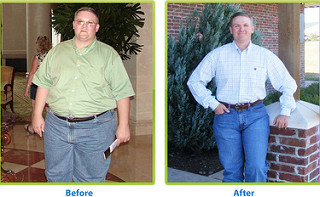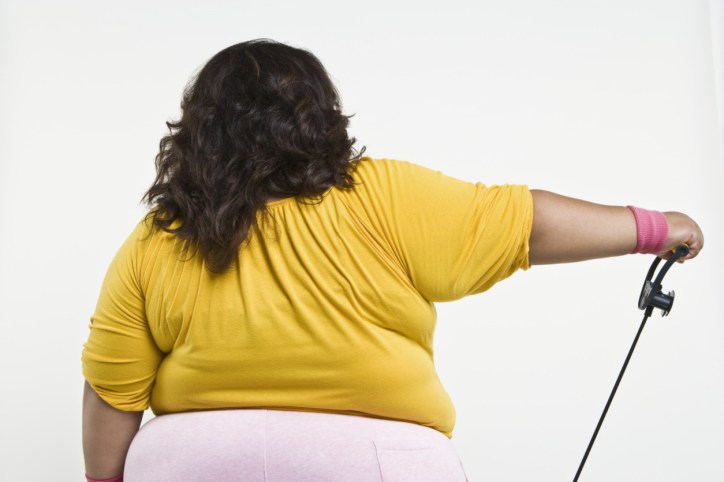Self-Sabotage and Weight Loss: How to Recognize and Overcome It
The 12-step programs have a slogan: The definition of insanity is doing the same thing over and over and expecting a different result. According to that definition, when it came to my weight, I was insane. Over the years, I counted points on Weight Watchers, ate frozen Jenny Craig food, worked out at Inches Away, guzzled Slim Fasts, slipped into trances in hypnotherapy, charged my body with Energy Tapping, yelled my emotions in Radix, and discovered my inner child in traditional talk therapy. Each time, I reached my goal weight, then gained most of the weight back. So two years ago, when an orthopedic surgeon told me I needed knee surgery but wouldn’t operate until I lost weight, something snapped. I had to do things differently.
For months after the surgeon’s pronouncement I resisted, complained, and procrastinated, but eventually reached acceptance. I needed a plan. I wasn’t comfortable in gyms where young people with buff bodies strutted their stuff. I am not, nor have I ever been inclined to jog or play sports. If I attempt something athletic, invariably I break a bone or strain a muscle. Instead, I found a gym filled mostly with folks on oxygen and who use walkers to get around. At 59, I was one of the youngest members. Exercise physiologists gave me a workout based on my history and physical abilities so I wouldn’t hurt myself or try to do too much too fast. The staff nutritionist taught me how to eat healthily without being obsessed.
I didn’t understand this at the time, but what I came up with was a way to become conscious about my body and food. Eckhart Tolle, in A New Earth, says humans carry an accumulation of old emotional pain, which he calls “the pain-body.” He also says the “pain-body” thrives on negativity, using emotionally painful experiences as food. No wonder I couldn’t sustain weight loss. My “pain-body” craved misery. Unless I learned to recognize when my “pain-body” became activated, it would continue to seek what it knew best—pain and suffering.
I decided to weigh myself every day. Previously, this led to obsession and daily frustration with results (or lack thereof). This time, my goal was to learn about and understand my body—to see what factors influenced my weight. I learned not to identify with what I saw on the scale. When I caught myself at the labeling game: “good” if I lost a pound; “bad” if I didn’t, I did what Tolle advises—accept “what is.”
Everyone’s body is different and I found what works for mine: I am hypoglycemic, but did not understand how that was affected by nutrition. I must eat a minimum of three starch servings per day (i.e. one slice of bread; ½ cup of whole wheat pasta). Otherwise, I get light-headed and quite irritable. Drinking enough fluids was important as well—I tend to retain water. Adding fruit and vegetables into my diet was hard, but crucial. I switched from products with white flour to whole grain pastas and breads. Lastly, I started taking probiotic supplements to normalize my body’s digestive system. Irregularity influences body weight.
Most importantly, I became familiar with the negative self-talk running through my head. It was challening to remain alert enough to recognize the voice of “the pain-body” and not react. But as this process unfolded, my attitudes began to shift and I found myself making different choices. What emerged were eight ways my “pain-body” tried to sabotage my weight loss. Tolle teaches us not to reject or resist our negative emotions, but to acknowledge their existence. Awareness and acceptance must come before actions if lasting changes are to occur. See if these internal dialogues from my “pain-body” sound familiar. They are followed by the positive way I reframed them:
1. Don’t get on the scale. Then you can pretend you’re not gaining the weight back.
The scale is my friend and keeps me honest. If my weight begins to creep up, I can stop it at five pounds, rather than 30.
2. Wear only clothing with elastic waists so you can pretend your clothes still fit.
If that zipper is a little snug, it’s time to take inventory. I need to get on the scale and find out how much damage I’ve done and take corrective action immediately.
3. Don’t keep track of what you are eating each day so you can tell yourself you stayed within your food plan.
Pay close attention to food choices and how my body feels before, during and after eating. This is especially important after I have reached my goal weight.
4. When you measure your portion sizes, it is okay to add a little bit here and there. It really won’t make a difference.
It really does make a difference. A little bit here, a little bit there adds up to a lot over time.
5. Once you reach your goal weight, you do not have to watch yourself that closely. Like magic, your weight will remain stable.
I have had a weight problem my whole adult life. It won’t go away just because I lost weight and achieved my goal. I have to remain watchful and stick to my new way of eating. I have to remain conscious and awake.
6. It’s okay to allow your mood to affect your decisions about food. It’s really okay if you are angry, depressed, sad, upset or happy and feel like eating. Go ahead and do it. You deserve to make yourself feel better or celebrate something.
Emotional eating is not okay. It is a momentary “fix” of the mood problem, but creates a much larger, longer-lasting problem—being overweight. I need to find other ways to soothe and comfort myself when my emotions flare up.
7. When your friends or family members tell you it is okay to eat what you want just this once, listen to them. They know better than you do what is best for you.
No one knows better than me what is good for me. Find ways to gently explain to my friends and family that I am working hard to eat healthily and it is important that I stick to my plan.
8. Even if you are feeling full, if that dish tastes better than anything you’ve ever tasted, it’s okay to finish it. Never leave food on a plate, especially at a restaurant. After all, you paid for it, you better finish it.
Despite the fact that there are people starving, it really is okay for me to leave food on my plate. I ask for a doggie bag at the beginning of the meal, and put half my meal into it. If I want dessert, I share it with someone. If no one wants to share and I can’t let go of the craving, I order what I want, take a few bites, and either leave the rest or bring it home.
These are the most frequent “pain-body” voices in my head. As I become more alert, I notice others. Catching them in the moment, rather than after I’ve already behaved unconsciously is vital to my weight loss success. I’ve lost and gained 30+ pounds four or five times in my adult life. Since the wakeup call from the surgeon and beginning this new way of approaching weight, I have lost 40 pounds. I don’t have a crystal ball to know whether I will keep it off this time. What I do know is my attitude towards and my relationship with food has changed. I no longer diet. I follow the nutritionist’s guidelines as well as I can. The most significant change, however, is being aware of my body and how it feels. The energy and intensity I had around eating has lifted and the negative voices, although still there, are much quieter and show up much less frequently.
Then, too, there is a new voice that comes in the stillness of being awake. If I listen carefully, it whispers, I’m full, and I stop eating, or you don’t really want those potatoes—you want salad instead. I don’t always pay attention and then the scale reflects the consequences. But more and more, I am present inside my own skin—and that has made me feel quite sane regarding eating.
-
Why Oolong is Important
Our hectic lifestyle caused us to greatly depend on commercially pr
-
Q&A: How To Fight Middle Age Weight Gain
Q: What are ways to keep weight off after middle age? It
-
Lose Weight Fast and Safe – What You Really Should to Know
To lose weight fast and safe, you need to start out with the end in mi
-
Artifical Grass Does Save Money And The Environment
Artifical grass is also called waterless grass since they are produce
-
Why You Must Use A Safe Weight Loss Programme
If youre concerned about your weight or
-
Can Particular Foods Aid In Weight Loss
Just as certain foods can cause us to gain weight there are other food
- DON'T MISS
- Emotional Eating, or Is It Really Just Poor Nutrition?
- 7 Ways to Eat Out and Still Lose Weight
- Diet UK: Weight Loss Tips Diet for a Healthy Diet
- The Best Breakfasts For Weight Loss
- Lose Weight Fast By Using The Calorie Budgeting Technique
- How To Lose Weight Websites
- Does Your Child Struggle With Obesity?
- A Realistic Weight Loss Plan: The Goal To Strive For
- 7 Tips To Lose Weight Before Thanksgiving (If Thats A Goal)
- Diet in 3 Hours - Sucha Thing?




